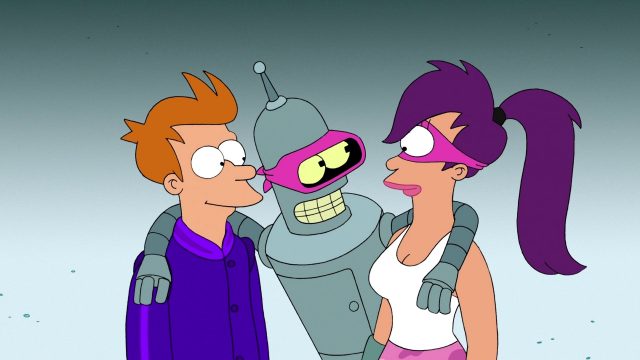“There’s no scientific consensus that life is important!”
“Bullhorns are a core principal of eco-feminism.”
“Stand by, men. And manly aliens.”
“Can I be brutally honest, Fry? I always wanted a son.”
“That hurt. But I can take it.”
Here it is, my least favourite of the four Futurama movies. As much as I disliked Bender’s Game, it made me laugh a lot; Into The Wild Green Yonder has some good belly laughs (“You wouldn’t ask Thomas Edison if he knew how to use a sexmotron!”), but the central premise of the movie is that Leela joins an eco-feminist group, and consistently the absolute worst part of the show is when it directly tackles gender dynamics. Look, we all enjoy ripping on Joss Whedon’s hollow pose of feminism, but the fact of the matter is that he was the most sophisticated game in town when it came to that subject, and if the world collectively surpassed Whedon over the course of the ’10s, it means recognising even widely beloved works like Futurama had at best a crude understanding of it.
There are a few cases where the feminism parodies cross over, if not into a good critique of the movement then at least an absurd situation (“There! Now you know how it feels to be locked in a go-go cage!” / “What the hell are you talking about, woman?”), but for the most part the satire, whether for or against feminism, is the most tooth-grindingly surface-level, when it’s not actively diving into lazy stereotypes (like the two Feministas who are cliche ditzy girls, or the fact that every man suddenly turns into a He-Man Woman Hater for the sake of a joke).
(By comparison, the eco- part of ecofeminism gets parodied more effectively – enlarging environmental destruction into a planet-sized miniature golf course is pretty awesome)
Strangely, the most effective part of the story for me is the Fry/Leela relationship. Fry’s personal part in the story is his discovery of the Madfellows, who tell him about an ancient war between two species, one of which intends to wipe out the universe or something. The emotional crux of it is two-fold; firstly, Fry, having apparently learned his lesson from Bender’s Big Score, begins the story completely respecting Leela’s decision to join the eco-feminists because he understands it makes her happy, even if it separates them, only for him to have to seemingly actively work against her and begging for her trust even when he can’t explain why. Unlike most Fry/Leela plots, this puts them on equal footing; the story is as much driven by Leela’s feelings for Fry as it is his for her. The triple-blow payoff of Leela trusting Fry, Fry seeming to sacrifice himself, and Leela and Fry’s kiss genuinely brings a tear to my eye. It’s just a shame that we have to navigate the godawful politics to get there.
Oh yeah, and Seth Macfarlane cameos as the singer of the opening number. That’s neat.

